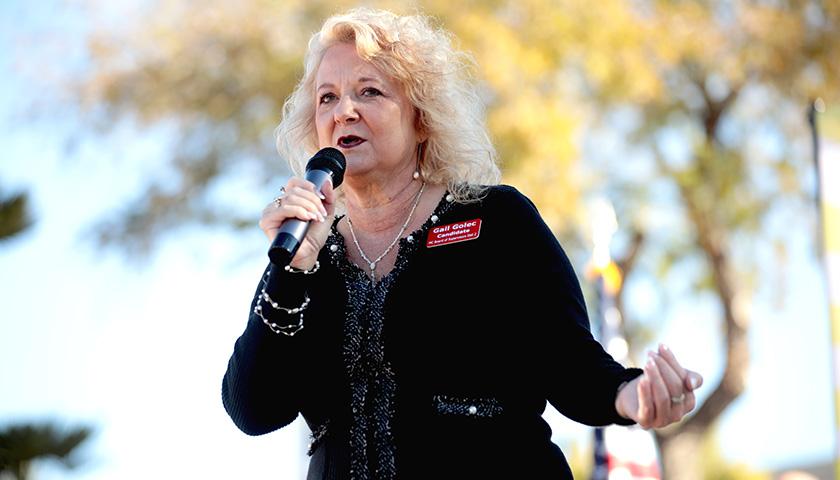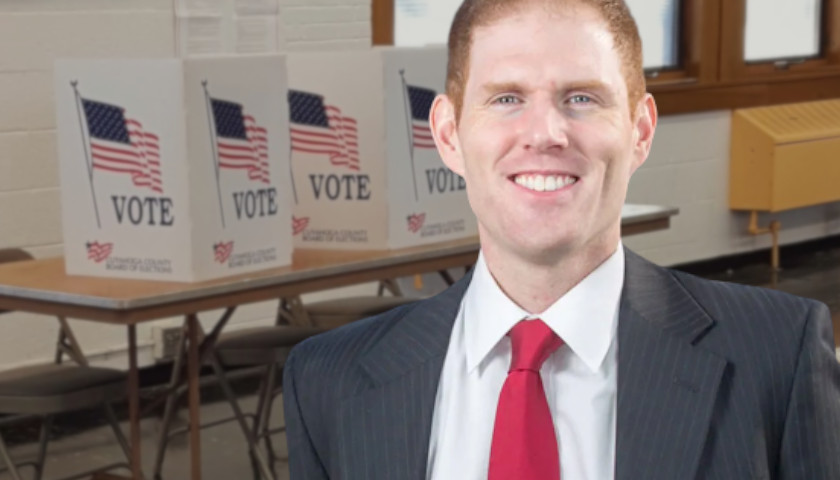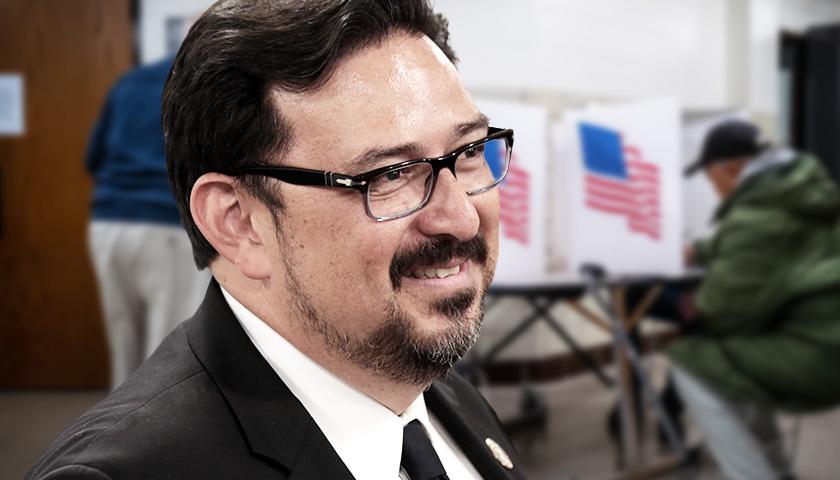Gail Golec, who unsuccessfully ran for Maricopa County Supervisor last year, filed a complaint with Arizona Secretary of State (AZSOS) Adrian Fontes last month alleging violations of the Help America Vote Act (HAVA) during last year’s midterm election, but the office rejected it. The complaint followed the procedures laid out in federal statutes; however, the AZSOS responded and said the complaint didn’t establish any violations to investigate under HAVA.
 Golec (pictured here), who is a state committeeman in LD3, the state lead for Cause of America, and vice president of government affairs for the Patriots of Arizona, told The Arizona Sun Times that she drafted the complaint based on the language in HAVA, so it didn’t make any sense that the AZSOS claimed the election discrepancies weren’t covered by HAVA. She said the problem is fundamentally how the AZSOS views elections, which she believes is dismissive of real complaints.
Golec (pictured here), who is a state committeeman in LD3, the state lead for Cause of America, and vice president of government affairs for the Patriots of Arizona, told The Arizona Sun Times that she drafted the complaint based on the language in HAVA, so it didn’t make any sense that the AZSOS claimed the election discrepancies weren’t covered by HAVA. She said the problem is fundamentally how the AZSOS views elections, which she believes is dismissive of real complaints.
“It’s not ‘fair and equal’ elections, it’s ‘free and equal’ per Article II Section 1 of the Constitution,” she said. “We’re going to turn the lights on to stop the gaslighting and take this country back.”
Although the AZSOS rejected the complaint, the response from Amy Chan, general counsel for the AZSOS, went over all 17 allegations listed in the complaint in a lengthy nine-page letter.
HAVA provides a means for citizens to file complaints alleging violations of HAVA. The AZSOS offers the complaint form on its website.
Golec stated in her complaint that the violations of HAVA are ongoing and will continue into the future. The letter cited the law, which provides that to receive federal money, secretaries of state must be in compliance with HAVA. If there are violations, they must be remedied within 60 days. If a complainant requests a hearing, one must be held on the alleged violations. The complaint was filed on January 3.
One of the allegations was that voters couldn’t correct their ballots. Section 301 of HAVA states that voters are to be notified if they accidentally overvoted, which means casting more than one vote for a single office. They are to be allowed an opportunity to correct their ballot. The language states, “the voting system … shall … if the voter selects votes for more than one candidate for a single office — (I) notify the voter that the voter has selected more than one candidate for a single office on the ballot; (II) notify the voter before the ballot is cast and counted of the effect of casting multiple votes for the office; and (III) provide the voter with the opportunity to correct the ballot before the ballot is cast and counted.”
During a panel discussion last week with Secretary of State Adrian Fontes and Maricopa County Recorder Stephen Richer, Richer said he would like to give voters the opportunity to correct their ballots, unlike Fontes, who preferred to have employees determine the intent. The AZSOS’s response stated that voters could correct their ballots, but they must inquire about it.
 Another count in the HAVA complaint alleged that there is “no permanent paper record with an audit capacity” created as required by Section 301. The law states in part, “The voting system shall produce a permanent paper record with a manual audit capacity for such System.” The AZSOS responded, “the voting equipment used in Maricopa County does, in fact, provide a paper-based audit trail.”
Another count in the HAVA complaint alleged that there is “no permanent paper record with an audit capacity” created as required by Section 301. The law states in part, “The voting system shall produce a permanent paper record with a manual audit capacity for such System.” The AZSOS responded, “the voting equipment used in Maricopa County does, in fact, provide a paper-based audit trail.”
Count 4 stated that the error rate for tabulating ballots is higher than HAVA’s allowable rate specified in Section 301. It provides, “For each processing function indicated above, the system shall achieve a target error rate of no more than one in 10,000,000 ballot positions, with a maximum acceptable error rate in the test process of one in 500,000 ballot positions.”
The AZSOS responded, “Count 4 of the consolidated Complaint does not allege that a provision of Title III has been violated,” apparently stating that it is outside the scope of HAVA.
Counts 5 and 6 alleged that HAVA was violated by using voting machine tabulators and also references the ballot-on-demand printers. The AZSOS again stated that this was outside the scope of HAVA, and stated regarding count six, “It appears that this Count is likewise the result of misinformation adopted by the Complainants.”
Golec alleged in count 7 that voters were allowed to vote after poll closing hours in Apache County, but the ballots were not separated out from regular ballots and were not provisional ballots as required by HAVA.
The AZSOS responded, “The Complaints claim that Apache County ‘did not separate the ballots and did not require them to be provisional ballots as required by law” appears not to be based on any of the Complainants’ personal experience, as each Complainant is a voter in Maricopa County.”
Count 8 stated that the voter registration rolls did not contain only “legally registered voters” as required by HAVA, and counts 9 and 11 stated that the rolls weren’t cleaned regularly. The AZSOS denied all three and claimed it was HAVA compliant.
Count 10 stated there wasn’t adequate technical security due to the “Poll Site books” having “internet remote access ability.” The AZSOS appeared to claim that this was outside the scope of HAVA but then added a lengthy discussion about internet access, declaring, “The Complaint’s claim that Maricopa County Electronic Poll Books have ‘internet remote access ability’ without sufficient security measures in place to prevent unauthorized access is therefore inaccurate at best, and the result of misinformation given to the Complainants at worst.”
For counts 12 through 14, Golec alleged that the AZSOS illegally outsourced verification of voter registration information to an outside private party, the Election Registration Information Center (ERIC). She stated that sharing voters’ personal information across state lines violated the law. ERIC was originally funded by left-wing billionaire George Soros through the Soros Open Society and Pew Charitable Trusts. The AZSOS admitted it shared information with ERIC but denied that it violated the law.
Counts 15 and 16 alleged that proper ID is not required for those who register to vote by mail, nor when they later vote by mail, and that the voter registration database is not adequately maintained. Golec cited a lengthy discussion in Section 303 of HAVA regarding voter ID requirements for registration and mail-in ballots, and HAVA’s requirements for voter registration lists. The AZSOS responded, stating that this did not fall under HAVA.
The final count asserted the state is not in compliance with minimal HAVA standards. The AZSOS disagreed, labeling it “misinformation.”
The complaint requested a list of remedies, including redoing the midterm election, requiring identification for mail-in ballots, and generating a new voter registration database without the old “corrupt” information.
Fontes praised the qualify of Arizona’s elections during last week’s forum.
He said, “It is important to note that Arizona has one of the best election systems and system frameworks from the United States of America. We have more ways for folks to vote, we have more access for folks.” He said people realize “we’re pretty darn good about what we do here” with elections. “I think we’re in really good shape.”
Golec created a video about the complaint and the AZSOS’s response.
– – –
Rachel Alexander is a reporter at The Arizona Sun Times and The Star News Network. Follow Rachel on Twitter. Email tips to [email protected].
Photo “Adrian Fontes” by Gage Skidmore. CC BY-SA 2.0. Background Photo “Election Day” by Phil Roeder. CC BY 2.0.





